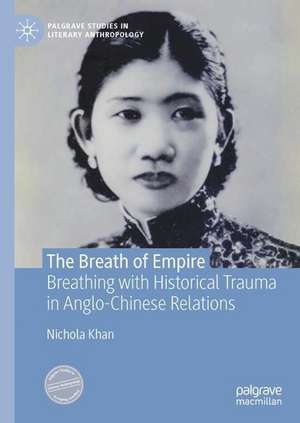The Breath of Empire: Breathing with Historical Trauma in Anglo-Chinese Relations: Palgrave Studies in Literary Anthropology
Autor Nichola Khanen Limba Engleză Hardback – 20 noi 2022
Din seria Palgrave Studies in Literary Anthropology
-
 Preț: 144.72 lei
Preț: 144.72 lei -
 Preț: 153.17 lei
Preț: 153.17 lei -
 Preț: 192.24 lei
Preț: 192.24 lei -
 Preț: 281.14 lei
Preț: 281.14 lei -
 Preț: 248.82 lei
Preț: 248.82 lei - 15%
 Preț: 582.30 lei
Preț: 582.30 lei - 15%
 Preț: 585.26 lei
Preț: 585.26 lei -
 Preț: 198.39 lei
Preț: 198.39 lei - 15%
 Preț: 578.70 lei
Preț: 578.70 lei - 15%
 Preț: 582.30 lei
Preț: 582.30 lei - 15%
 Preț: 635.47 lei
Preț: 635.47 lei -
 Preț: 211.47 lei
Preț: 211.47 lei - 15%
 Preț: 581.98 lei
Preț: 581.98 lei - 18%
 Preț: 779.39 lei
Preț: 779.39 lei - 18%
 Preț: 887.24 lei
Preț: 887.24 lei - 18%
 Preț: 776.09 lei
Preț: 776.09 lei - 18%
 Preț: 723.69 lei
Preț: 723.69 lei - 18%
 Preț: 719.28 lei
Preț: 719.28 lei - 18%
 Preț: 775.96 lei
Preț: 775.96 lei - 18%
 Preț: 775.78 lei
Preț: 775.78 lei - 18%
 Preț: 892.90 lei
Preț: 892.90 lei -
 Preț: 313.39 lei
Preț: 313.39 lei
Preț: 351.49 lei
Nou
Puncte Express: 527
Preț estimativ în valută:
67.26€ • 70.41$ • 55.65£
67.26€ • 70.41$ • 55.65£
Carte tipărită la comandă
Livrare economică 05-19 aprilie
Preluare comenzi: 021 569.72.76
Specificații
ISBN-13: 9783031176890
ISBN-10: 3031176898
Pagini: 129
Ilustrații: XXI, 129 p. 2 illus.
Dimensiuni: 148 x 210 mm
Greutate: 0.34 kg
Ediția:1st ed. 2022
Editura: Springer International Publishing
Colecția Palgrave Macmillan
Seria Palgrave Studies in Literary Anthropology
Locul publicării:Cham, Switzerland
ISBN-10: 3031176898
Pagini: 129
Ilustrații: XXI, 129 p. 2 illus.
Dimensiuni: 148 x 210 mm
Greutate: 0.34 kg
Ediția:1st ed. 2022
Editura: Springer International Publishing
Colecția Palgrave Macmillan
Seria Palgrave Studies in Literary Anthropology
Locul publicării:Cham, Switzerland
Cuprins
1. Breathing With Historical Trauma.- 2 Breathing as Transgenerational Transmission.- 3 Women’s Intimacies After Empire: Respiratory Histories for the Future.- 4 Conclusion: Breathing as Life.
Notă biografică
Nichola Khan is Reader in Anthropology and Psychology in the School of Humanities and Social Science and Co-Director of the Centre for Spatial, Environmental and Cultural Politics at the University of Brighton, UK.
Textul de pe ultima copertă
“Taking ‘respiratory politics’, ‘intimacies’ that are visceral and intrusive, and ‘violence’ as theoretical tropes and ethnographic narrative and mnemonic, this book offers fresh and important contributions to scholarly understandings in women’s studies, the anthropology of the body, and post-colonial scholarship through its engaged examination of state repression, and its reprisal of historical fears of suffocation and dying across historical and geopolitical spans.”
—Junjie Chen, Professor of Anthropology, Minzu University of China
“The book is timely and interconnected to recent history, particularly the connections drawn between historical trauma and intergenerational infection and contagion set against wartime trauma, and the Covid virus as a global phenomenon as devastating as the ravages of war. […] Khan has accomplished an original and interdisciplinary academic work.” —Xu Xi 許素細, author of Monkey in Residence & Other Speculations, This Fish is Fowl, Dear Hong Kong, That Man in Our Lives
This Palgrave Pivot combines anthropological, biographical and autoethnographic perspectives onto imperial intimacies, the transgenerational transmission of colonial and familial trauma, and violence in two kinds of household: the Chinese family in British Hong Kong and wider imperial Asia, and the Anglo-Chinese family in England. Conjoining approaches from literary anthropology, the historiography of Anglo-Chinese relations, and perspectives on colonial trauma, it highlights the relative neglect of women’s stories in customary Chinese readings, colonial accounts, and an ancestral family record from 1800 to the present. Offering an alternative view of family history, this book links the body as a dwelling for assaults on the ability to breathe—through tuberculosis, opium smoking, asthma, and panic—with the physical home that is assaulted in turn by bombs, killing, intimate betrayals, and fatalrespiratory illness. The COVID-19 “pandemic of breathlessness” serves as mnemonic both for state repression, and for the reprisal of historical fears of suffocation and dying. These phenomena converge under an analytic concept the author calls respiratory politics.
—Junjie Chen, Professor of Anthropology, Minzu University of China
“The book is timely and interconnected to recent history, particularly the connections drawn between historical trauma and intergenerational infection and contagion set against wartime trauma, and the Covid virus as a global phenomenon as devastating as the ravages of war. […] Khan has accomplished an original and interdisciplinary academic work.” —Xu Xi 許素細, author of Monkey in Residence & Other Speculations, This Fish is Fowl, Dear Hong Kong, That Man in Our Lives
This Palgrave Pivot combines anthropological, biographical and autoethnographic perspectives onto imperial intimacies, the transgenerational transmission of colonial and familial trauma, and violence in two kinds of household: the Chinese family in British Hong Kong and wider imperial Asia, and the Anglo-Chinese family in England. Conjoining approaches from literary anthropology, the historiography of Anglo-Chinese relations, and perspectives on colonial trauma, it highlights the relative neglect of women’s stories in customary Chinese readings, colonial accounts, and an ancestral family record from 1800 to the present. Offering an alternative view of family history, this book links the body as a dwelling for assaults on the ability to breathe—through tuberculosis, opium smoking, asthma, and panic—with the physical home that is assaulted in turn by bombs, killing, intimate betrayals, and fatalrespiratory illness. The COVID-19 “pandemic of breathlessness” serves as mnemonic both for state repression, and for the reprisal of historical fears of suffocation and dying. These phenomena converge under an analytic concept the author calls respiratory politics.
Nichola Khan is Reader in Anthropology and Psychology in the School of Humanities and Social Science and Co-Director of the Centre for Spatial, Environmental and Cultural Politics at the University of Brighton, UK.
Caracteristici
Offers an innovative perspective on imperial intimacies, the transgenerational transmission trauma, and violence Combines anthropological, biographical and autoethnographic perspectives Advances scholarship in women studies, anthropology of body, literary anthropology, and post-colonial studies
